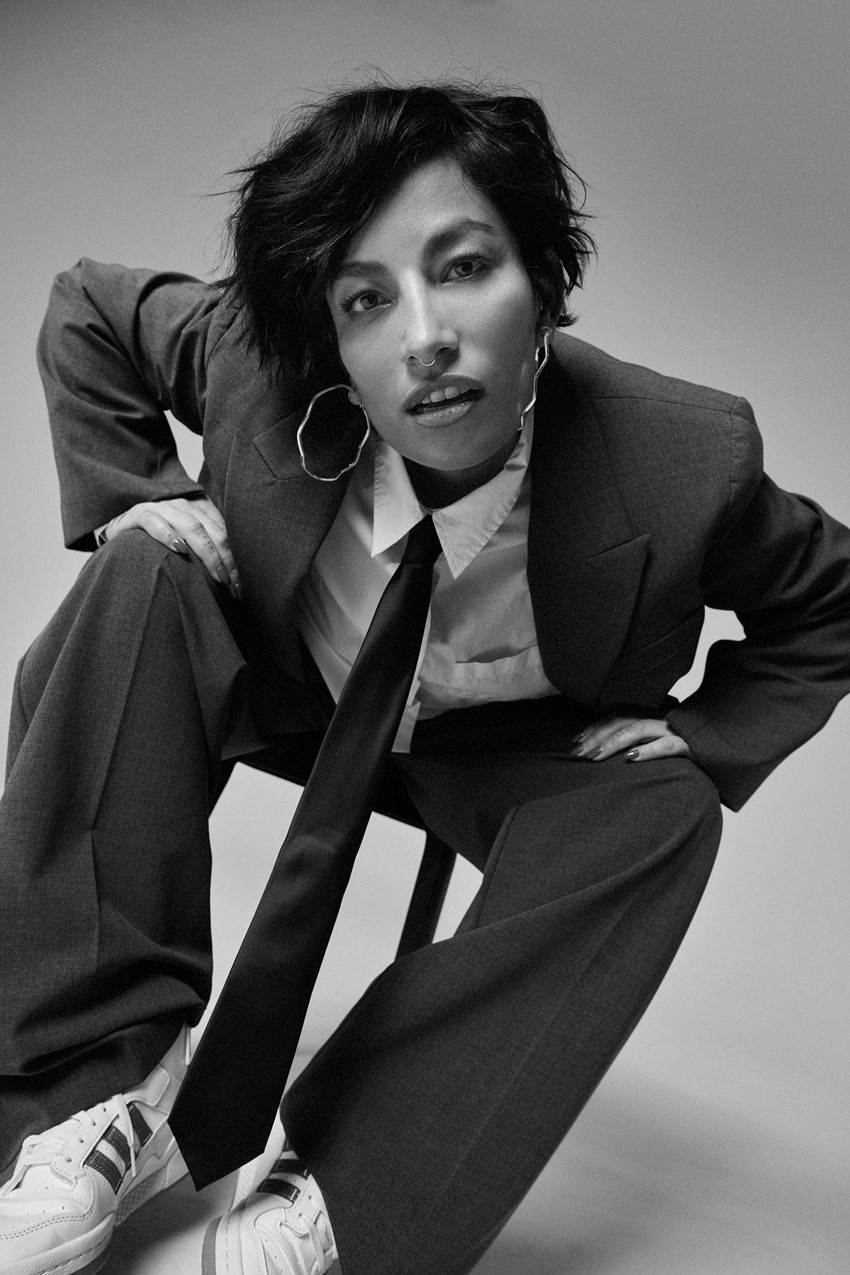Thursday, February 29, 2024
Ana Tijoux interview: “If I didn’t smile, I’d sink”
Charis McGowan finds Chilean rapper Ana Tijoux in a reflective mood as she talks about her much-awaited new album. “I wanted to create something more complete, take time to write a different type of album,” she confides

Ana Tijoux (photo: Javiera Gajardo)
“I don’t know if joyful is the right word, but I wanted to make an album that didn’t repeat the same formula,” says Ana Tijoux about her latest album, Vida. Her first full-length release in nine years, it’s been hard to predict the direction that the Chilean MC would take after such a lengthy hiatus.
Her fifth solo album to date, Vida takes a drastic turn from her most recent standalone songs: 2019’s ‘Cacerolazo’ and 2020’s ‘Antifa Dance’, both defiant protest anthems released in the aftermath of a nationwide uprising against inequality in Chile, which was met with fierce repression from the state. The tracks fit neatly into her two-decade-spanning career of soundtracking injustice, at first with Chilean hip-hop group Makiza in the 1990s, and then as a solo artist in the 2000s.
In the past, Tijoux has mixed throwback beats, brassy Latin horns and wind instruments with lyrics that called out the corrupt (‘Los Peces Gordos No Pueden Volar’), fought against misogyny (‘Antipatriarca’) and expressed solidarity with Chilean youth’s decades-long struggle for equal education rights (‘Shock’). Hence, “joyful” marks a distinct shift for an artist whose work is so intrinsically tied to political rage. “If I didn’t smile, I’d sink,” she says, “it’s really hard to write about happiness, but I lost a lot of people in a short amount of time, and I needed to move my energy in a different direction.”
‘Tania’ is one of Vida’s first singles, named after her late sister. The song is an uplifting tribute, with ska trumpet bursts and a danceable cumbia rhythm. “I’m not sure if Vida is a homage [to the people I’ve lost], but it is a reflection on life and all of its nuances,” contemplates Tijoux.
Despite the nine-year hiatus, Vida came together in just one year. Tijoux had been busy: “I was travelling a lot,” she reflects – she moved from Chile to Europe, spent time raising her children and was not in one place long enough to work on a longer project. When she began working on Vida, she knew she needed time and space: “I wanted to create something more complete, take time to write a different type of album.”

Ana Tijoux (photo: Nacho Rojas)
Standout tracks on Vida are reminiscent of her early work with Makiza, integrating the classic 90s hip-hop sound that underscores her work: The Notorious B.I.G.’s ‘Juicy’ is deliciously interpolated on throwback track ‘Tu Sae’, which features Brooklyn legend Talib Kweli from rap duo Black Star.
Despite the echoes of her back catalogue, Tijoux describes Vida as a “musical” record rather than a pure rap one, where her vocals as a singer take centre stage. ‘Cora’ is a melodic, moving reflection on the beat of a heart, the pulsating rhythm reflecting a will to dance through life, as something corporally innate to mankind. These moments of reflections and gratitude are also present on songs like ‘Millonaria’: ‘I’m a millionaire… I have a family who embraces me,’ she sings in Spanish, a piano-driven ode to what truly enriches life.
Tijoux explains her appreciation of joy as something intangibly connected to her lifelong dialogue with equality and justice. “I am privileged. There are no bombs falling over me, my children are healthy, there is food on the table.” Several times in our interview, Tijoux mentions Gaza. Chile is home to one of the largest Palestinian communities outside of the Middle East, creating a strong connection between Chile and the Palestinian struggle for freedom. Tijoux has numerous Palestinian friends and collaborated with Palestinian-British rapper Shadia Mansour on the 2014 protest song ‘Somos Sur’. When war broke out last year, Tijoux immediately used her platform to express solidarity, organising and performing at a large festival in Santiago to raise funds for medical aid in Gaza.
“If you look at the youth in Gaza, they are still doing workshops in the camps, teaching children how to juggle, or dance. In the middle of everything, they keep finding life within the absurd,” she said. “I find so much strength in that, to get up on my feet, to keep walking, to sing. It gives me oxygen.” That’s why Tijoux’s celebration of happiness is integral to her vision of resistance and collective action. “We have to share with our friends, ask each other how we are, what we’re going to do for each other, call our Palestinian friends and tell them we love them, we’re here for them.”
The first single off the album, ‘Niñx’, is a bold message of empowerment to future generations, and one of Vida’s most politically charged. A synthesizer trill is intercut by a jutting marching beat that builds into an explosive chorus, recalling the march of protest drums. ‘You have your grandmother’s eyes / you carry power / we are the rocks sprung from the riots,’ she spits in a rallying cry to dance and sing with pride despite life’s challenges. Tijoux says she wrote the song for one of her children, “to never lose the joyful rebellion,” she recounts. “Demanding a fairer world has to do with wanting a good life, right? It’s a perspective that is filled with happiness.”
Now 46, Tijoux’s desire to engage with younger generations extends from her lyrics into the very fabric of her songs. One of the album’s most aggressive moments, ‘Dime Que’, is a furious trap track with Chilean rapper Pablo Chill-E, an artist at the forefront of a new generation of Chilean urban artists. It’s a seething exploration of justice and privilege, ‘I miss my brothers behind bars,’ raps Chill-E, who examines how the system criminalises the poor and protects the wealthy: ‘The politicians steal the money that your grandma pays her bills with.’
The song bears testimony to Tijoux’s towering presence in Chile’s political rap traditions, a genre synonymous with giving voice to the marginalised in an unforgivingly unequal society. Such ideas remain as significant and relevant today as when she began to make music during Chile’s dawning democracy. Tijoux’s parents were persecuted under Pinochet’s torturous 17-year regime, forcing them to flee to France, where Tijoux spent her youth until democracy was restored in the 1990s. The members of Makiza were all children of exiles, an experience that shaped the political nature of their work.
Even today, Pinochet’s dark shadow continues to stir tension in Chile. In the aftermath of the 2019 protests, Chileans sought to change their ruling constitution, a relic from Pinochet’s regime. However, the process has proved frustrating and polarising. After two attempts – one radically liberal, the other extremely conservative – Chileans voted to keep the 1980 charter. “Everything was changed, just to go back to Pinochet’s constitution. It’s surreal,” says Tijoux,
In the face of such absurdity, to struggle for change and go back to square one, Tijoux refuses to be consumed by anger. This is something she views as an act of sheer resistance. ‘I decided to be happy,’ she sings blissfully on breezy track ‘Bailando Sola Aquí’ (Dancing Alone Here).
In ‘Fin del Mundo’ (End of the World) hushed vocals, pop harmonies and soft keys are lusciously layered onto a pulsating electro beat. The last track of Vida, it is a neat conclusion of her philosophy; at times the only thing left is company and joy, which is worth celebrating until the very end: ‘They say at any moment the world will end… / and if the world’s end does come / let’s dance naked together.’
+ ‘Tania’ features on the Top of the World compilation in the April 2024 (#196) issue. Ana Tijoux will perform at the Village Underground, London on April 13 as part of La Linea 24. For tickets, click here.
This article originally appeared in the April 2024 (#196) issue of Songlines magazine. Never miss an issue – subscribe today
Want to DISCOVER the WORLD through MUSIC? Subscribe to Songlines' free newsletter here

